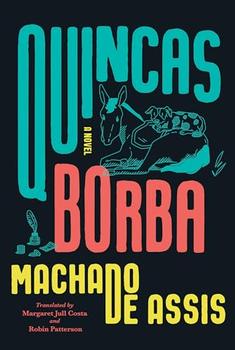
A Novel
by Joaquim Maria Machado de Assis
A satirical tale of a young man flush with newfound wealth who promptly gets swindled, Quincas Borba is an inspired critique of nineteenth-century Brazil.
Hailed in his lifetime as one of Latin America's greatest writers, Machado de Assis (1839–1908) was a storyteller known for his wholly innovative narrative techniques and uncanny talent for unraveling the social and political milieu of nineteenth-century Brazil. These signature traits are on full display in Quincas Borba, a novel that sees Machado satirize a rapidly changing Rio de Janeiro.
Originally published in 1891, the story begins with the death of its titular character, a mad philosopher infamous for spouting pessimistic theories of "Humanitism." Borba leaves his fortune―including his dog, also named Quincas Borba―to Rubião, his loyal caretaker and a schoolteacher by trade. Bestowed with opulence beyond his wildest dreams, Rubião is quickly coaxed into the comforts of a rich man's life―the only stipulation being that he continues to care for the canine Quincas Borba with the same dedication he once did the human. Adrift in the big, bad, bustling world of late-1860s Rio de Janeiro, it isn't long before Rubião is targeted by the city's sycophants, who can smell his naïveté from a mile away.
Playfully told by an omniscient and possibly unreliable narrator, the novel is at once irreverent and ambitious, brimming with barbed wit and keen philosophical inquiry. Brilliantly translated by Margaret Jull Costa and Robin Patterson―the duo credited with introducing a new generation of readers to Machado through their translations of Dom Casmurro, The Collected Stories, and Posthumous Memoirs of Bras Cubas―Quincas Borba is another strikingly modern tale from a blazing progenitor of twentieth-century fiction.
"Parodic...A welcome, fresh translation of an overlooked classic, a superb novel of (bad) manners." ―Kirkus Reviews (starred review)
"Truth to life in Quincas Borba depends...on the author's continuing presence as ringmaster and stage manager, constantly reminding us of his power to dissipate or rearrange the universe he created....Characters become handy vehicles for this speculative approach to putting a novel together." —The New York Times Book Review
"A great ironist, a tragic comedian... . In his books, in their most comic moments, he underlines the suffering by making us laugh." ―Philip Roth
"In the sureness of pace, the ingratiating swerve, Machado is peerless." ―Elizabeth Hardwick
"The creator of a tremendous oeuvre and an inimitable sense of humor." ―José Saramago
This information about Quincas Borba was first featured
in "The BookBrowse Review" - BookBrowse's membership magazine, and in our weekly "Publishing This Week" newsletter. Publication information is for the USA, and (unless stated otherwise) represents the first print edition. The reviews are necessarily limited to those that were available to us ahead of publication. If you are the publisher or author and feel that they do not properly reflect the range of media opinion now available, send us a message with the mainstream reviews that you would like to see added.
Any "Author Information" displayed below reflects the author's biography at the time this particular book was published.
Joaquim Maria Machado de Assis (1839–1908) was born in Rio de Janeiro and, as well as his seven short-story collections, wrote such groundbreaking novels as Posthumous Memoirs of Brás Cubas, Dom Casmurro, Quincas Borba and The Alienist.
Margaret Jull Costa, who has translated Javier Marías and José Saramago, lives in England.
Robin Patterson has translated José Luandino Vieira and lives in England.
Your guide toexceptional books
BookBrowse seeks out and recommends the best in contemporary fiction and nonfiction—books that not only engage and entertain but also deepen our understanding of ourselves and the world around us.